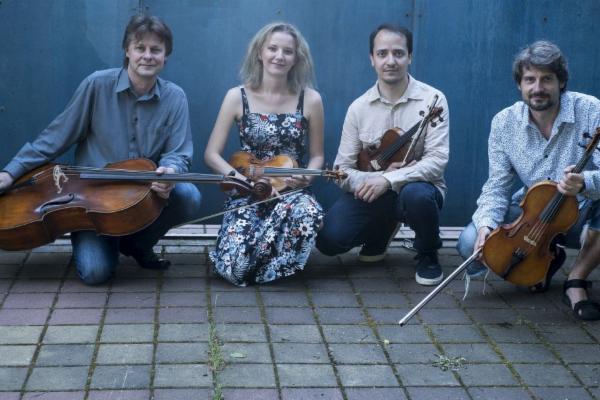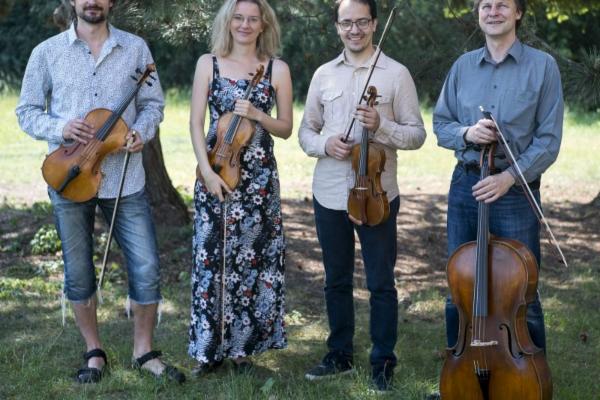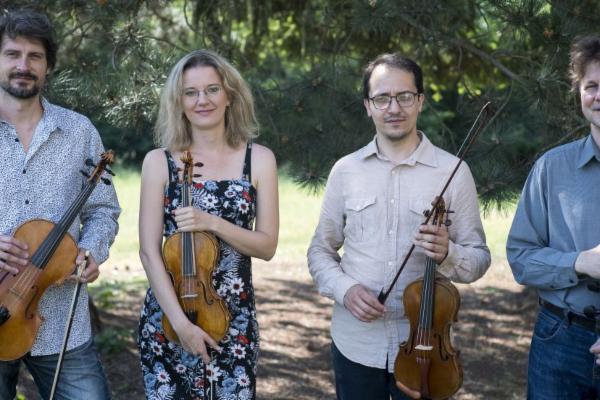Reicha Quartet records Anton Reicha: Quatuor Scientifique
Reicha Quartet is recording its debut CD with Anton Reicha's unpublished music. Be part of it!
Author: Reicha Quartet
EUR 2,839
pledged of
EUR 2,766
102% completed
20 contributors pledged
All or nothing. Project finished on Jul 22, 2018 at 17:00.
Choose reward for your contribution
-
sold 1Special thanksThank you so much for your support. Every bit helps. You will receive our personal thank you message to your e-mail with all the news about our ongoing recording session.
Reward delivery: in a month after the Hithit project end
EUR 3.95(CZK 100) -
sold 0A thank-you-postcardYou will receive our brand new postcard with our personal thanks.
Reward delivery: on address, in a month after the Hithit project end
EUR 7.90(CZK 200) -
sold 0Be first: Pantomime before publishingAre you eager to start discovering the Pantomime? Be first to hear this track straight after editing.
Reward delivery: in a month after the Hithit project end
EUR 9.88(CZK 250) -
sold 2Digital downloadDigital download of the full recording.
Reward delivery: in half a year after the Hithit project end
EUR 11.85(CZK 300) -
sold 2CD Rejcha: Quatuor ScientifiquePhysical CD of the completed recording sent to your home address.
Reward delivery: on address, in half a year after the Hithit project end
EUR 17.78(CZK 450) -
sold 7Signed CDA signed CD Rejcha: Quatuor Scientifique sent to your home address.
Reward delivery: on address, in half a year after the Hithit project end
EUR 21.73(CZK 550) -
sold 0Musical technoligiesOur cellist oscillates between historical musical instruments and modern technologies. Accept an invitation to his home studio in Prague, where you can try one of the following for 2 hours:
1 / notation software (Sibelius + Finale)
2 / recording and editing of classical music
3 / electronic musical instruments (the list of equipment will be sent in turn on request)
Reward delivery: not specified
EUR 31.61(CZK 800) -
sold 1Violin/cello lessonA 60min lesson in violin/cello playing by one of our number.
Only available in the Czech Republic, a violin lesson also possible in Randstad in the Netherlands.
Reward delivery: not specified
EUR 35.56(CZK 900) -
sold 2An evening with RQ and beer from regional breweriesMembers of the Rejcha Quartet are beer lovers from the production of small breweries. Come with us to our favorite pub in Prague. Participation of at least three RQ members is ensured. Spending at your own expenses.
Reward delivery: not specified
EUR 59.27(CZK 1,500) -
sold 0Signed CD with the scoreThe reward for our fans who just have to have our new CD with sheet music. The package will include a complete score with the parts of the unpublished Quatuor Scientifique and the CD.
Reward delivery: on address, in half a year after the Hithit project end
EUR 71.36(CZK 1,806) -
sold 2SponsorThank you for becoming our sponsor. Your name and/or your logo will appear in the credits of the physical album.
Reward delivery: not specified
EUR 197.55(CZK 5,000) -
remaining 4 from 5Privat concert for the little onesWe will play, talk, compete and solve puzzles. Take your children and children of your friends and we will entertain them for 45 minutes. Available also in English.
Time availabilities and other details will be arranged via e-mail reichaquartet@gmail.com.
For concerts outside of the Czech Republic please count on additional travel expenses.
Reward delivery: not specified
EUR 474.12(CZK 12,000) -
sold 2Private concertA private concert only for you and your friends. We’ll perform 50 minutes of music from our repertoire.
Time availabilities and other details will be arranged via e-mail reichaquartet@gmail.com.
For concerts outside of the Czech Republic please count on additional travel expenses.Reward delivery: not specified
EUR 790.20(CZK 20,000)
How it all began…
"We want the pantomime," said a voice behind a heavy red curtain that separated the private part of the building. The stony passage of the Viennese monastery, where Rejcha had been forced to come, was built in such a way to give an echo to every word. "I do not dance!" This passage was definitely not heated, thought Rejcha, who had just survived an unusually cold winter of the year 1806. "You do not understand. We need you to write the music to this script,” a pale white hand passed through the curtain, holding a yellowy parchment with a hard to read text. "It is a secret message we need to convey in the form of music and dance." Rejcha pulled his hat firmly over his ears. He had never met such idiots. "No one needs to die if you complete the work until the moon reaches the second full moon." Yes, idiots. Rejcha snatched the piece of paper out of the hand and went off to compose the desired piece while mumbling contemptuously. – And that’s what happened, or not...
Our goal
Rejcha's music mesmerized us completely - it is original, intelligent, funny, and very exceptional in its time. Despite this, Rejcha remains in the background of interest. We'd like to change that!
Why Quatuor Scientifique?
Quatuor Scientifique (1806) is a very unique work. It consists of 12 movements each of which is full of unconventional ideas; fugues according to W. A. Mozart and J. Haydn or a crazy 5/8 bar movement.
... and what about the pantomime?
In the Parisian library where the quartet's manuscript is located, there is a mysterious score attached to its parts. This is the single movement ‚La Pantomime‘ with the subtitle ‚Fantasy for Two Violins, Viola and Cello‘. It makes an intoduction to the whole Quatuor Scientifique. Rejcha wrote it most likely as music for dance performance. The first violin part is partly underlaid with a text which is not complete. It only refers to a literary work, which is unknown to us. Following the example of Hercule Poirot, you might help with the search for its origin, if you wish.
Reicha Quartet
Members of the Reicha Quartet have a common desire. They try to understand the longings and efforts of artists and audiences in the late 18th and early 19th century. They attempt to penetrate the feelings and thoughts which lead to creating unique works full of strong emotions and self-reflection. They share a fascination over how easy it is these days to look into the past - thanks to the relatively easy accessibility of primary sources and early prints. By reading the critical reviews and views on music production and composition, aesthetic essays and commentaries to cultural events, they gain insight into the aesthetics of 18th and 19th century. When we read the parts of Mendelssohn quartets marked by Ferdinand David - the violinist who performed with Mendelssohn himself, we feel like looking over his shoulder just at the very moment when he played the first violin part. When we read The Notebooks of Antonín Reicha, we feel the writing to be addressed to us as well as to his contemporaries. We feel it is our duty to use our empathy and knowledge to convey this experience to audience and thus share the results of our work.
Why Hithit?
Making of an album is a fairly expensive affair; from renting the recording space, hiring the sound director to editing. Our enthusiasm only is not enough for this task. Getting financial support for such a project, in the cultural sector in general, is a highly difficult task. That is why we approach you, the enthusiastic listeners who believe in our work and think together with us that Rejcha's music is worth it.
Choose reward for your contribution
-
sold 1Special thanksThank you so much for your support. Every bit helps. You will receive our personal thank you message to your e-mail with all the news about our ongoing recording session.
Reward delivery: in a month after the Hithit project end
EUR 3.95(CZK 100) -
sold 0A thank-you-postcardYou will receive our brand new postcard with our personal thanks.
Reward delivery: on address, in a month after the Hithit project end
EUR 7.90(CZK 200) -
sold 0Be first: Pantomime before publishingAre you eager to start discovering the Pantomime? Be first to hear this track straight after editing.
Reward delivery: in a month after the Hithit project end
EUR 9.88(CZK 250) -
sold 2Digital downloadDigital download of the full recording.
Reward delivery: in half a year after the Hithit project end
EUR 11.85(CZK 300) -
sold 2CD Rejcha: Quatuor ScientifiquePhysical CD of the completed recording sent to your home address.
Reward delivery: on address, in half a year after the Hithit project end
EUR 17.78(CZK 450) -
sold 7Signed CDA signed CD Rejcha: Quatuor Scientifique sent to your home address.
Reward delivery: on address, in half a year after the Hithit project end
EUR 21.73(CZK 550) -
sold 0Musical technoligiesOur cellist oscillates between historical musical instruments and modern technologies. Accept an invitation to his home studio in Prague, where you can try one of the following for 2 hours:
1 / notation software (Sibelius + Finale)
2 / recording and editing of classical music
3 / electronic musical instruments (the list of equipment will be sent in turn on request)
Reward delivery: not specified
EUR 31.61(CZK 800) -
sold 1Violin/cello lessonA 60min lesson in violin/cello playing by one of our number.
Only available in the Czech Republic, a violin lesson also possible in Randstad in the Netherlands.
Reward delivery: not specified
EUR 35.56(CZK 900) -
sold 2An evening with RQ and beer from regional breweriesMembers of the Rejcha Quartet are beer lovers from the production of small breweries. Come with us to our favorite pub in Prague. Participation of at least three RQ members is ensured. Spending at your own expenses.
Reward delivery: not specified
EUR 59.27(CZK 1,500) -
sold 0Signed CD with the scoreThe reward for our fans who just have to have our new CD with sheet music. The package will include a complete score with the parts of the unpublished Quatuor Scientifique and the CD.
Reward delivery: on address, in half a year after the Hithit project end
EUR 71.36(CZK 1,806) -
sold 2SponsorThank you for becoming our sponsor. Your name and/or your logo will appear in the credits of the physical album.
Reward delivery: not specified
EUR 197.55(CZK 5,000) -
remaining 4 from 5Privat concert for the little onesWe will play, talk, compete and solve puzzles. Take your children and children of your friends and we will entertain them for 45 minutes. Available also in English.
Time availabilities and other details will be arranged via e-mail reichaquartet@gmail.com.
For concerts outside of the Czech Republic please count on additional travel expenses.
Reward delivery: not specified
EUR 474.12(CZK 12,000) -
sold 2Private concertA private concert only for you and your friends. We’ll perform 50 minutes of music from our repertoire.
Time availabilities and other details will be arranged via e-mail reichaquartet@gmail.com.
For concerts outside of the Czech Republic please count on additional travel expenses.Reward delivery: not specified
EUR 790.20(CZK 20,000)





Comments